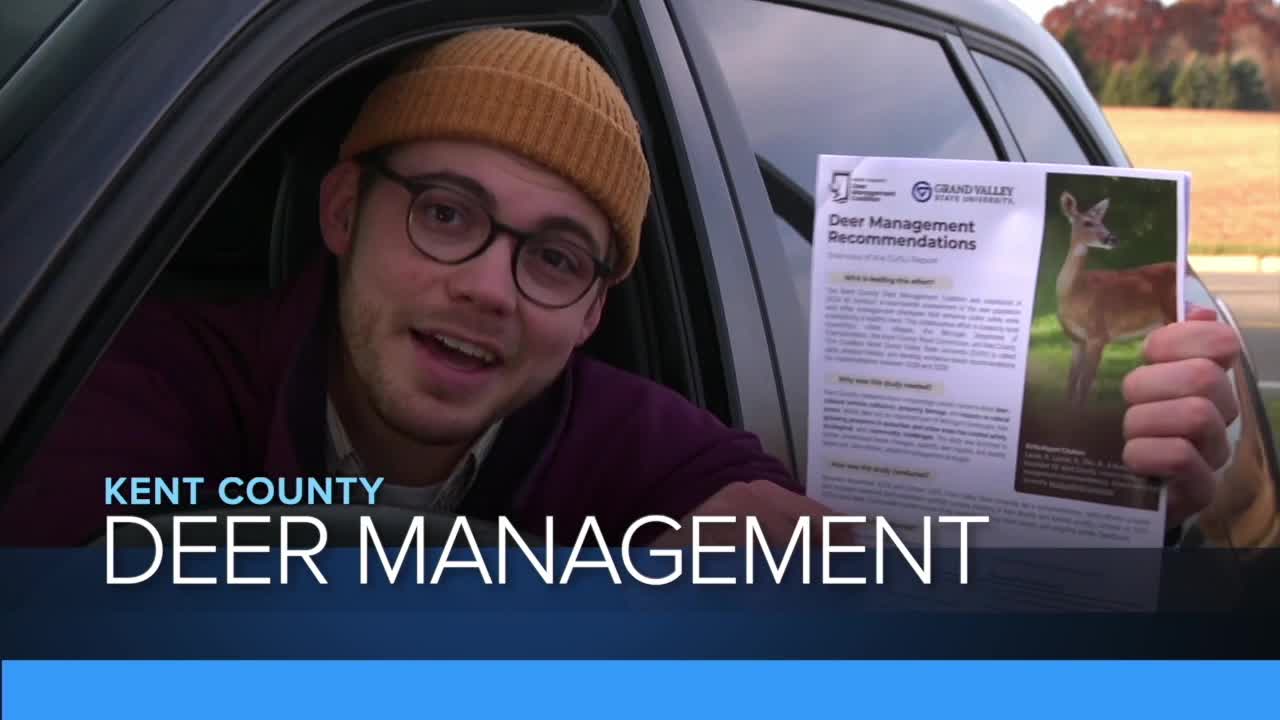KENT COUNTY, Mich. — Whether you love them, hate them, hunt them or see them lying on the side of the road, deer are a defining part of Kent County.
On Wednesday, the Kent County Deer Management Coalition, after a yearlong study, released its recommendations on how to improve the health of the county's deer herd and reduce human conflicts with the animal.
A partnership between Kent County, the Kent County Road Commission, Grand Valley State University, the Michigan Department of Transportation and local municipalities, the coalition was formed as a response to a rise in deer-related car crashes and a decline in hunters in West Michigan.
Recommendations
- Population Management
- Urban archery hunting (1)
- Location-specific deer harvests with ethical use of the animal (2)
- Hunter recruitment and access to land (3)
- Habitat Management
- Roadside mowing (4)
- Native landscaping (5)
- Establish and enforce bans on deer feeding (6)
- Engagement and Planning
- Monitor public perception on deer management (7)
- Plan for long-term deer management (8)
How to harvest
In two years, the coalition wants to reduce deer-related car crashes in Kent County by 1,050 through increasing annual deer harvests by 1,900, focusing specifically on antlerless deer due to their breeding ability.
If successful, this would remove around 13-20% of the deer herd in the county.
"The county seeks to shift deer mortality from roadways to ethical harvests, reducing waste and improving herd balance," the coalition said in an overview of its report.
For Jerry Byrne, managing director of the Kent County Road Commission, such a shift makes sense. He's seen disease work its way through dense herds, listened to complaints from residents about torn up gardens and seen his employees bring far too many smelling, rotting carcasses to the landfill.

Kent
DEER SHERIFF: Kent County road worker has picked up nearly 50,000 carcasses
"We can harvest them with our car and pay our insurance rates," Byrne said. "Alternatively, we can harvest and eat them and get something out of them."
As it relates to its recommendation for location-specific deer harvests, the coalition says, whether through hunting, culling or damage permits, all deer should be "fully and respectfully used."
"Wildlife resources are a public trust, must not be wasted, and should be managed scientifically for the benefit of current and future generations," the coalition said, setting a goal for hunters in the county to annually donate 2,000 pounds of venison to hunger-relief programs.
READ MORE: 'Costs me money': Grand Rapids residents' lawns overrun with deer
"I've talked to a number of people on the phone who say hunting is cruel," Byrne said. "Well, have you ever picked up a dead deer alongside the road? A lot of times it's not dead instantly. If you think getting hit by a car is painless, that is far from painless."

Deer Management Units
As part of its recommendations, the coalition also offered specific direction for six, geographically distinct areas in Kent County, referred to as Deer Management Units (DMUs).
- Northwest
- Alpine Township, Cedar Springs, Solon Township, Sparta Township, Tyrone Township
- Recommendations: 2, 3, 4, 7
- Alpine Township, Cedar Springs, Solon Township, Sparta Township, Tyrone Township
- Northeast
- Algoma Township, Cannon Township, Courtland Township, Nelson Township, Oakfield Township, Spencer Township
- Recommendations: 2, 7
- Algoma Township, Cannon Township, Courtland Township, Nelson Township, Oakfield Township, Spencer Township
- West-Central
- East Grand Rapids, Grand Rapids, Grandville, Kentwood, Plainfield Township, Rockford, Walker, Wyoming
- 1, 2, 4, 5, 7, 8
- East Grand Rapids, Grand Rapids, Grandville, Kentwood, Plainfield Township, Rockford, Walker, Wyoming
- Central
- Ada Township, Cascade Township, Grand Rapids Township
- Recommendations: 1, 2, 3, 4, 5, 6, 7, 8
- Ada Township, Cascade Township, Grand Rapids Township
- East and Southeast
- Bowne Township, Caledonia Township, Grattan Township, Lowell, Lowell Township, Vergennes Township
- Recommendations: 2, 3, 4, 7
- Bowne Township, Caledonia Township, Grattan Township, Lowell, Lowell Township, Vergennes Township
- Southwest
- Byron Township, Gaines Township
- Recommendations: 3, 4, 7
- Byron Township, Gaines Township

In order for these recommendations to be successful, the coalition says management "must occur county-wide."
"This is a race," Kent County Road Commission Managing Director Jerry Byrne said to FOX 17 on Wednesday. "It's not a sprint. It's a marathon."
"This is going to go year after year after year," he said. "That's why the county, cities and villages are going to need to work together to make sure it is long-term management."
Study
These recommendations come as a result of a yearlong, data-driven study conducted by Grand Valley State University.
As previously reported by FOX 17, professors and students at the university conducted nightly deer population surveys, mapped deer density and habitat quality, reviewed crash data and collected public feedback through a series of open houses and a survey.

Kent
Deer in the dark: GVSU conducting data collection for Kent County
“The data collected, the attention to detail and all the statistics that went into it, it's not my opinion," GVSU Associate Professor of Biology Ali Locher said to FOX 17 on Wednesday. It's the data driving this. We just interpreted it for everybody."
"As a scientist, I feel really good about the rationale and justification behind the numbers," Locher said. "As a human, I believe it."
For a summary of the recommendations from the Kent County Deer Management Coalition, click here.
For the full report from the Kent County Deer Management Coalition, click here.












